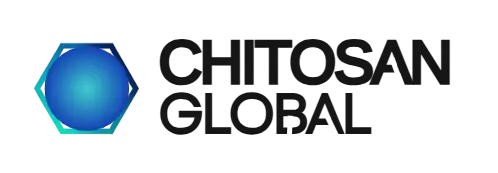
What is Chitosan?
Chitosan is a natural biopolymer extracted from chitin.
Origin and Abundance
- Chitin is the second most abundant natural polysaccharide in nature, after cellulose.
- Most fungi contain 5%-7% chitin in their cell walls.
- Chitin is also found in the exoskeletons of crustaceans (crabs, shrimp, lobsters) and insects.
Pronunciation Guide
- Chitin: Pronounced “KITE-in” (emphasis on “kite”)
- Deacetylation: Pronounced “dee-a-SETTLE-ay-shun” (emphasis on “dee”)
- Acetyl: Pronounced “A-see-tl” (emphasis on “see”)
Chemical Structure and Properties
Chitosan is obtained through a process called deacetylation of chitin. This involves:
- Removing acetyl groups (CH3OH) from the chitin molecule
- Creating a polymer with free amine groups (NH2) as shown below.

This chemical transformation gives chitosan its positive charge, differentiating it from its parent compound, chitin.
- Solubility: Unlike chitin, chitosan is soluble in acidic to neutral solutions, making it more versatile for various applications. Our food-grade mushroom chitosan oligosaccharide is soluble in water at any pH. It is bactericidal at pH 6.4 and below. To purchase wholesale, click HERE
- Biocompatibility and Biodegradability: Chitosan is known for its excellent biocompatibility and biodegradability. It’s non-toxic and can be broken down by natural biological processes.
Uses and Applications:
- Healthcare and Pharmaceuticals: Chitosan’s biocompatibility makes it invaluable in medical applications. It is used in wound healing products, drug delivery systems, and as a biomaterial in tissue engineering. Its ability to promote healing and control drug release has made it a popular choice in the pharmaceutical industry.
- Environmental Protection: In water treatment, chitosan’s capacity to bind with heavy metals and other contaminants makes it an effective agent for purification processes. This property has led to its use in both industrial and municipal water treatment facilities.
- Agriculture: Farmers and agronomists utilize chitosan as a natural biostimulant and elicitor. It enhances plant growth and boosts resistance against pathogens, contributing to more sustainable agricultural practices.
- Food Industry: Chitosan serves multiple purposes in food production and preservation. It acts as an antimicrobial food additive and can be used to create edible films or coatings that extend the shelf life of perishable products.
- Beverage Production: In the alcoholic beverage industry, chitosan is used for clarification of wines, beers, and whiskeys, helping to improve their characteristics and stability.
- Dietary Supplements: The compound is also used in the production of dietary supplements, capitalizing on its potential health benefits.
- Plastics Industry: Chitosan’s biodegradable nature makes it an attractive option for developing eco-friendly plastic alternatives.

The wide-ranging applications of chitosan stem from its unique combination of biocompatibility, biodegradability, non-toxicity, and a positive charge.
Mushroom-derived chitosan has emerged as a versatile and effective ingredient in personal care products. Here’s an overview of its key advantages and applications:

- Film-forming capabilities:
- Chitosan oligosaccharide forms a thin, flexible film on the skin’s surface.
- This film can help smooth out fine lines and wrinkles, creating a temporary tightening effect.
- Wrinkle reduction:
- The tightening effect can visibly reduce the appearance of fine lines and wrinkles.
- This gives the skin a smoother, more youthful appearance.
- Moisture retention:
- The film also helps lock in moisture, which is crucial for maintaining skin elasticity and preventing premature aging.
- Antioxidant properties:
- Chitosan oligosaccharide has antioxidant effects that can help protect the skin from free radical damage.
- This may slow down the aging process at a cellular level.
- Collagen stimulation:
- Some studies suggest that chitosan derivatives may help stimulate collagen production in the skin.
- Increased collagen can improve skin firmness and elasticity over time.
- Enhanced ingredient delivery:
- The film-forming nature of chitosan oligosaccharide may help other anti-aging ingredients penetrate more effectively into the skin.
- Natural alternative:
- As a mushroom-derived ingredient, it offers a natural alternative to synthetic anti-aging compounds.

- Natural antimicrobial properties:
- Mushroom chitosan has inherent antimicrobial capabilities that can help control bacterial growth on the skin.
- This makes it an excellent ingredient for products targeting acne and other skin conditions related to bacterial overgrowth.
- Acne prevention and treatment:
- By reducing bacterial proliferation, chitosan can help prevent the formation of new acne lesions.
- It may also assist in healing existing blemishes by creating an unfavorable environment for acne-causing bacteria.
- Versatility in formulations:
- Chitosan can be incorporated into various skincare products such as:
- Cleansers
- Face masks
- Spot treatments
- Moisturizers for acne-prone skin
- Chitosan can be incorporated into various skincare products such as:
- Gentle on skin:
- Unlike some harsh chemical antimicrobials, mushroom chitosan is generally well-tolerated by most skin types.
- This makes it suitable for those with sensitive or reactive skin who still need antimicrobial benefits.
- Synergistic effects:
- Chitosan can work well in combination with other acne-fighting ingredients, potentially enhancing their effectiveness.
- Balancing the skin microbiome:
- By selectively targeting harmful bacteria, chitosan may help maintain a healthy balance of the skin’s natural microbiome.
- Additional benefits:
- Beyond its antimicrobial properties, chitosan’s moisturizing and film-forming capabilities can help improve overall skin health and appearance.


- Alignment with clean beauty trends:
- Mushroom chitosan fits perfectly with the growing consumer demand for natural, plant-based ingredients in personal care products.
- It appeals to consumers seeking “cleaner” and more sustainable beauty options.
- Eco-friendly alternative:
- As a biopolymer derived from mushrooms, chitosan offers a sustainable alternative to synthetic ingredients.
- This aligns with increasing consumer awareness of environmental issues and preference for environmentally friendly products.
- Organic formulation potential:
- Mushroom chitosan can be sourced from organically grown mushrooms, making it suitable for use in certified organic personal care products.
- This expands its appeal to the growing organic beauty market segment.
- Multi-functional natural ingredient:
- Chitosan’s versatility (moisturizing, antimicrobial, film-forming properties) allows formulators to replace multiple synthetic ingredients with a single natural one.
- Transparency and traceability:
- The clear origin of mushroom chitosan (versus marine sources) can appeal to consumers seeking transparency in their product ingredients.
- Vegan-friendly option:
- Unlike shellfish-derived chitosan, mushroom chitosan is suitable for vegan formulations, broadening its market appeal.
- Potential for local sourcing:
- Mushroom cultivation can be done locally in many regions, potentially allowing for shorter supply chains and “locally-sourced” claims.
- The organic personal care products market was valued at USD 21.5 billion in 2022 and is expected to grow at a CAGR of over 8.4% between 2023 and 2032.
- Key factors driving demand include health, safety, environmental impact, and product efficacy.
- Consumers are increasingly interested in products that protect the body’s biome and address root problems rather than just symptoms.

- Thickening Agent:
- Chitosan can increase the viscosity of formulations, creating richer textures in creams and lotions.
- This thickening effect can improve the sensory experience of products, making them feel more luxurious and substantial.
- It allows formulators to achieve desired consistencies without relying solely on synthetic thickeners.
- Stabilizing Agent:
- Chitosan helps maintain the stability of emulsions (mixtures of oil and water-based ingredients).
- It can prevent separation of ingredients over time, extending the shelf life of products.
- This stabilizing effect is particularly valuable in moisturizers, lotions, and other emulsion-based formulations.
- Texture Enhancement:
- The film-forming properties of chitosan contribute to a smooth, silky feel in products.
- It can help create a more even and appealing texture in creams and lotions.
- Natural Alternative:
- As a natural polymer, chitosan offers a plant-based alternative to synthetic thickeners and stabilizers.
- This aligns with the trend towards natural and clean beauty products, as shown in the image of the mushroom chitosan moisturizer.
- Multifunctional Ingredient:
- While acting as a thickener and stabilizer, chitosan simultaneously provides other benefits like moisturization and antimicrobial properties.
- This multifunctionality can simplify formulations and reduce the need for additional ingredients.
- Compatibility:
- Chitosan is generally compatible with a wide range of other cosmetic ingredients, making it versatile for various formulations.
- pH-Responsive Behavior:
- Chitosan’s thickening properties can be pH-dependent, allowing for interesting formulation possibilities and targeted product performance.

These properties make mushroom chitosan a versatile ingredient in the personal care industry, contributing to product effectiveness and enhancing consumer appeal.
Which type of chitosan is best suited for personal care applications?
Choosing the right type of vegetal chitosan for personal care applications depends on the specific product’s formulation requirements and the desired functional properties. Here’s a breakdown of the suitability of each type of chitosan for different personal care applications:
- Acid-Soluble Chitosan (with varying viscosities)
- 20-100 cps: Suitable for lightweight, non-greasy formulations such as serums, toners, and facial mists where quick absorption and light feel are desirable.
- 100-500 cps: Good for medium-viscosity applications like gels and emulsions where moderate thickness and stabilization are needed without heavy texture.
- 500-1000 cps: Best for thick creams, heavy gels, and masks where a thicker consistency is crucial for the product’s stability and performance.
- Chitosan Hydrochloride
- This form is highly soluble in water and mildly acidic to neutral pH, making it ideal for formulations where good solubility and pH stability are required. It’s suitable for eye gels, moisturizers, and wound healing applications due to its gentle nature on skin and mucous membranes.
- Chitosan Oligosaccharide
- Known for its excellent biocompatibility and low molecular weight, which allows for better skin penetration. This makes it ideal for anti-aging products, serums, and other skincare products aimed at deep skin repair and rejuvenation.
- Carboxymethyl Chitosan
- This derivative of chitosan is highly water-soluble and possesses strong moisturizing and anti-inflammatory properties. It’s particularly suitable for sensitive skin products, soothing creams, and lotions, as well as in hydrating sprays and after-sun products.
Application-specific Recommendations:
- Skin Care: Chitosan oligosaccharide and carboxymethyl chitosan are excellent for skin care due to their skin-friendly properties.
- Hair Care: Higher viscosity acid-soluble chitosan can be used in hair gels and conditioners for better film formation and strength.
- Oral Care: Chitosan hydrochloride is beneficial due to its solubility and mildness, ideal for mouthwashes and toothpastes.
- Cosmetics: Acid-soluble chitosan with lower viscosities is preferred in cosmetic formulations for a lighter feel.
- Deodorants and Antiperspirants: Chitosan hydrochloride due to its solubility and gentle effect on skin.
- Men’s Grooming: Carboxymethyl chitosan for soothing and moisturizing properties in aftershave and beard products.
Of course, selecting the appropriate type of chitosan enhances the product’s efficacy and consumer appeal by aligning its functional properties with the intended application.
In hair care products, chitosan is used in concentrations of about 0.5% to 1.5%, where it contributes to hair strength and shine by forming a protective film on each strand.
This not only improves the hair’s appearance but also protects it from environmental damage.
The use of chitosan extends to oral care products as well, particularly in the form of chitosan hydrochloride, which is appreciated for its ability to bind to bacteria and reduce plaque formation, included in products at concentrations ranging from 0.2% to 2%.
Whether enhancing the stability of emulsions in creams and lotions or improving the efficacy of hygiene products, chitosan’s role in personal care continues to grow, driven by consumer demand for natural and effective ingredients.
Book a Free Consultation
If you don’t know what type of chitosan is best for your situation, Book an appointment. we will offer you an initial 30-minute consultation and product quotation at no charge.
